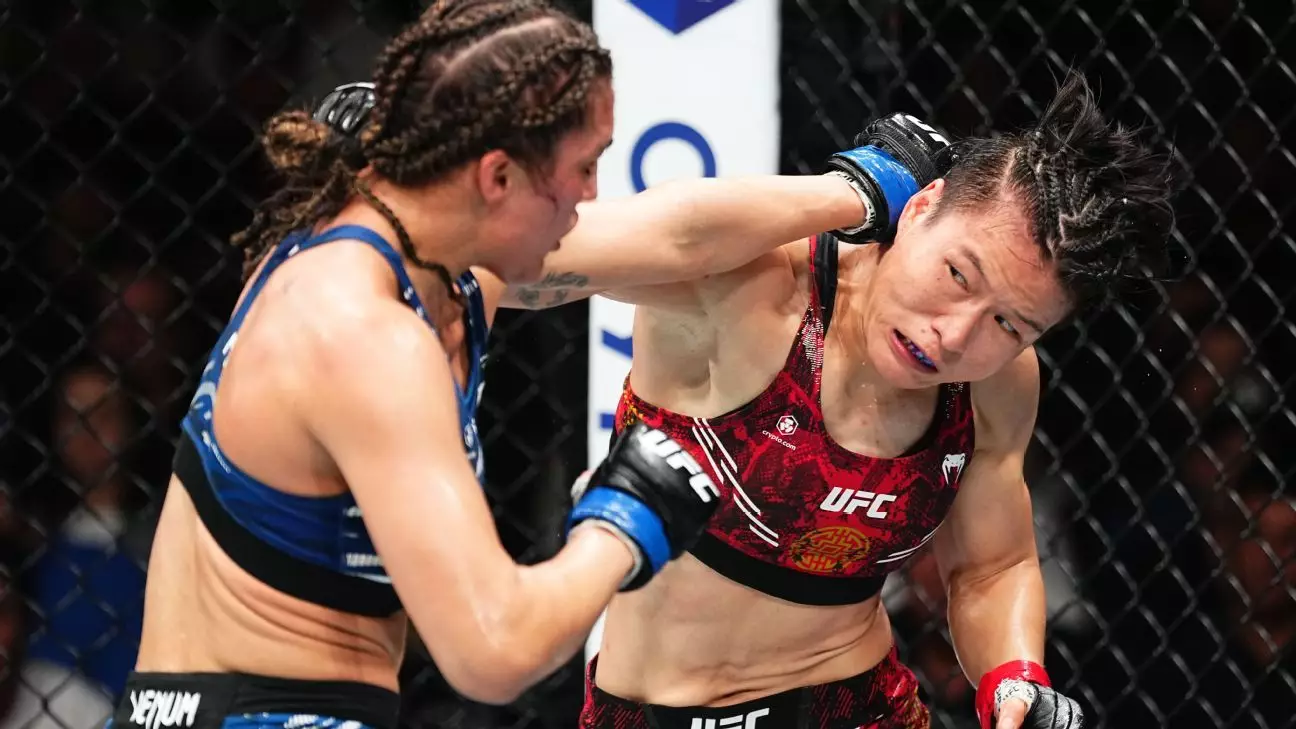Zhang Weili reaffirmed her position as the women’s strawweight champion with a compelling performance against the previously unbeaten Tatiana Suarez at UFC 312, held at Qudos Bank Arena in Sydney. Weili’s victory by unanimous decision (49-46, 49-46, 49-45) showcased not only her striking prowess but also her exceptional grappling skills, leading to a clear and decisive win. This fight was anticipated as a critical test for Zhang, whose reputation had already been bolstered by previous dominant performances against top contenders such as Carla Esparza and Amanda Lemos. However, she emerged from the octagon with a stellar showing that left fans and analysts alike in awe.
The significance of this bout was underscored by the fact that Suarez, a decorated wrestler, was deemed a formidable challenger. One could argue that the pre-fight conversations painted Suarez as a serious threat, juxtaposed against Zhang’s established legacy. With her wrestling pedigree, having won “The Ultimate Fighter” Season 23, Suarez was seen as capable of challenging Zhang’s reign effectively. However, Weili entered the ring with an unshakeable confidence that belied her status as the betting underdog. The matchup presented a fascinating clash of styles—the grappling expertise of Suarez against the striking intensity and strategic savvy of Weili.
From the opening bell, the bout established Zhang’s dominance. Despite the early moment where she found herself on the canvas, Weili quickly regained her footing and flipped the dynamics in her favor. Defending an impressive 14 out of 15 takedown attempts and outstriking Suarez by a staggering 251 to 61, Zhang demonstrated an impeccable understanding of the fight’s momentum. Each round was a display of her proficiency in maintaining distance, picking her shots, and countering Suarez’s wrestling with remarkable poise. The champion not only outstruck her opponent but also capitalized on her mistakes, landing clean shots and dictating the pace.
As the match progressed into the later rounds, it became evident that Suarez’s stamina was slipping. Zhang capitalized on this deterioration, employing a mix of striking and grappling that left the challenger visibly battered and outmatched. One notable moment came in the third round when Zhang executed a leg trip, bringing Suarez to the ground. This maneuver was significant as it not only showcased Zhang’s wrestling acumen but also illustrated a pivotal turning point in the fight. For the first time in Suarez’s career, she found herself on the receiving end, and the psychological impact of this shift was palpable throughout the remainder of the match.
As the fight neared its conclusion, Suarez’s frustrations became evident. Her continued attempts at takedowns lacked the finesse of earlier in the bout, reflecting a fighter who had lost her rhythm and was desperate to reclaim control. Zhang’s resilience paid off; she absorbed the pressure and continued to land strikes, solidifying her status as a champion. By the final bell, she had not only defended her title but made a statement about her prowess within the division.
Post-fight discussions shifted toward Zhang’s future. UFC president Dana White lauded her performance, mentioning the potential for her to move up to the flyweight division and challenge reigning champion Valentina Shevchenko. The prospect of a two-division champion is enticing and indicative of Zhang’s ambition, as well as the UFC’s desire to promote high-stakes matchups. White’s comments about Zhang possibly becoming the greatest female fighter of all time resonate with the fight community, reflecting a growing consensus about her elite status.
Ultimately, Zhang Weili’s performance at UFC 312 was not merely a display of dominance; it was a masterclass in precision, strategy, and mental fortitude. As she looks toward new challenges, her place at the top of the women’s strawweight division is undeniably secure, yet the anticipation of her next move adds an exciting layer to an already illustrious career.

